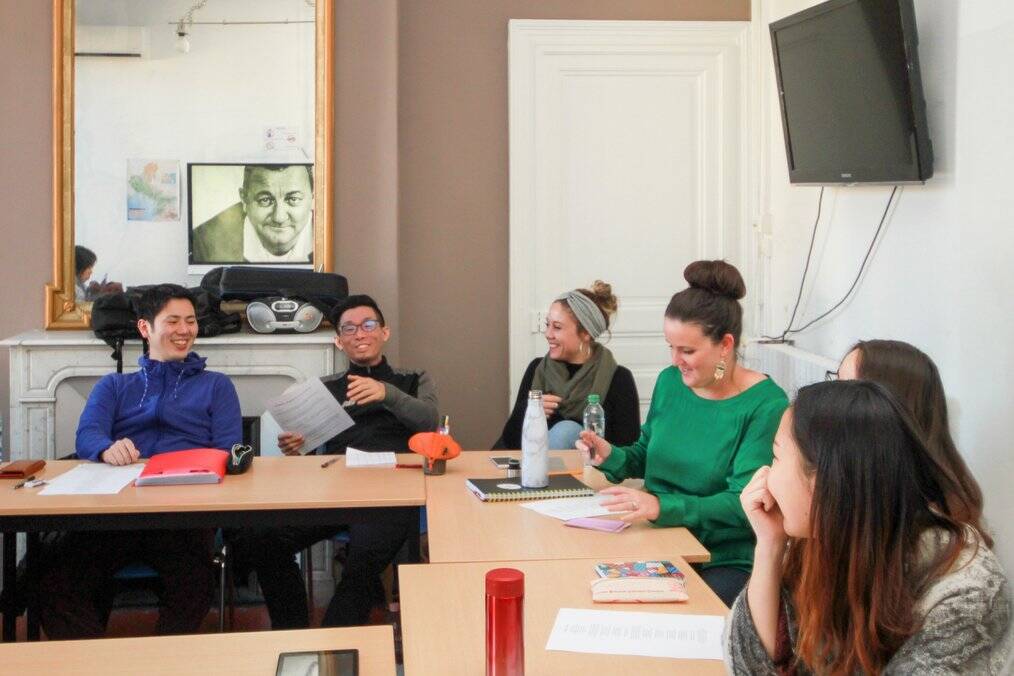
Learn French Abroad: Top 5 Immersion Programs in 2025
Immerse yourself in a French-speaking country to level-up your language skills!
Whether you’re a beginner or have been studying for several years, the best way to learn French is by immersing yourself in the language and culture. French language courses abroad help you do just that!
Learning French in France is a great option but it isn't your only option! French is the official language of 29 countries. Not only does speaking French open many doors to meaningful travel worldwide, but it also means you’ll have tons of destinations to choose from to start your language learning journey.
Read on to get the lowdown on how and where to find the best French immersion programs for adults overseas!
Benefits of learning French abroad
Aside from getting to see an exciting new country and crossing living abroad off your bucket list, what are the benefits of learning French abroad? Here are some of the advantages to consider:
- Learn through total immersion. Sometimes learners need a little push to engage in their target language. Living in a French-speaking country means you’ll be interacting with the language on a daily basis and you likely won’t be able to fall back on an English safety net. Some experts claim total immersion is the easiest way to learn French. Why not give it a try and see for yourself?
- Experience and better understand French-speaking cultures. Knowing more about the culture will help your language learning, believe it or not! Culture influences language and understanding cultural references will make it easier to enjoy books and TV in your target language.
- Meet French-speaking friends. Making new friends is always great and when those friends are French-speaking, it’s an added bonus. Friends who speak the language will not only help you practice but will give you insight into the culture, history, and local events. It will also help you learn conversational French in a natural setting!
- Improve your accent. French pronunciation can be tricky but hearing French spoken all around you will definitely help you improve your accent. What better way to soak it all in than having a coffee on a sunny terrace surrounded by chatty native speakers?
"Spent almost 2 months in Paris with EF and it was a time well spent during my Gap Year! My French prior to arriving was so basic and I knew almost nothing. At the end, I left Paris being able to have a full convo with any French local. I came back with more knowledge than just the French language."
Best places to learn French

While it may seem like a no-brainer to learn French in France, there are tons of awesome countries to choose from where French is the majority language. Check out some of the best!
- Paris, France: The City of Lights is an appealing destination for French language students all over the world. A hub of history, culture, and art, Paris has plenty of exciting venues to practice your French while enjoying the sights, sounds, and tastes of this enchanting city.
- Nice, France: Located on the French Riviera, Nice is a glamorous destination to level-up your French. If you love beaches, Nice has some of the best in France. Spend your days practicing conversational French lessons that you can put into action over dinner in a restaurant by the sea.
- Brussels, Belgium: Belgium is an interesting country linguistically, with Flemish predominantly spoken in the north and French in the south. Brussels is officially bilingual, with many speaking both French and Flemish (though the majority lean toward French as the lingua franca). Considered the de facto capital of the EU, you’ll find an international flavor in Brussels with plenty of cool markets where you can grab a hot and delicious Brussels waffle.
- Montreal, Canada: If you don’t want to go too far from home, the Québec region of Canada has French as an official language. The variety of French spoken here, known as Quebecois, has a distinct rhythm and pronunciation. In Montreal, the province’s largest city, you’ll find gorgeous French colonial architecture and countless parks and gardens to relax in while you study verb conjugations.
- Geneva, Switzerland: Switzerland is another fascinating multilingual country with 4 official languages: German, Italian, Romansh, and of course, French! If you’re an outdoor enthusiast with a particular interest in hiking or skiing, Switzerland is a great choice for your French learning. Geneva is a particularly breathtaking city set on Lake Geneva that boasts a mountainous backdrop and easy access to nature.
- Rabat, Morocco: While French is not an official language (those are Arabic and Berber), it is still widely spoken, particularly among academics and professionals and in Rabat, the capital city. There are several immersive French schools in Rabat that are infused with Moroccan culture, and provide a diverse environment to learn about North African politics, art, and history.
Whether you want to join a French immersion program or study part-time over a longer period of time, there are a world of options to choose from in these locations.
1. EF International Language Campuses

Location: Paris, Nice, or Côte d'Azur, France
Program length: 2-52 weeks
Starting price: $1,450 for 2 weeks
What's included: homestay with local family, meals, between 20-32 lessons a week, cultural activities, learning materials
✅ Pros:
- A homestay, including home-cooked French meals, is included in the price.
- Free activities include tours, cooking classes, BBQs, museums, game nights, and more.
❌ Cons:
- If you wish to stay in a student residence instead of a homestay, the cost of the room and meals is extra.
- EF’s program is among the pricier options.
If you want to study French in France, EF is one of the best programs out there. EF International Language Campuses provides an all-inclusive immersive experience in 3 of the best places to learn French in France: Paris, Nice, and Côte d'Azur (The French Riviera)! Choose from their basic, general, or intensive programs with either 20, 26, or 32 lessons, respectively. Whether you’re on a mission to improve your French for work or school or would like to have plenty of free time to enjoy the local area, there are options for every student.
Past EF participants praised the funny and engaging teachers and their ability to make new friends. The vast majority of alumni also loved their homestay experience and ability to have home-cooked meals and practice French outside of the classroom. What better way to improve your French than to live with a local family in Paris?
Program Details
2. Lankey

Location: Rabat, Morocco
Program length: 3 or 6 weeks
Starting price: $3,000 USD for 3 weeks
What's included: accommodation, meals (depending on the plan), transportation, activities and excursion, 24/7 support
✅ Pros:
- The language program ends with a 4-day excursion to the Atlas Mountains, Sahara Desert, and Marrakech.
- There are spring break trips lasting 10 or 15 days if you’re short on time.
❌ Cons:
- The main programs are only 3 or 6 weeks, though customized programs for longer stays can be negotiated.
- For safety reasons, participants need to obtain permission for activities outside of those scheduled.
If you want to learn French in Africa, Lankey offers the opportunity to learn French in Morocco. You’ll stay with a carefully vetted Moroccan host family or in a downtown apartment in the bustling capital, Rabat. Plans are flexible to allow students to choose whether meals are included or excluded.
At the end of an engaging several weeks in the classroom, you’ll put your French to the test as you travel around Morocco for four days with your classmates and a dedicated guide. You’ll have the opportunity to trek the Atlas Mountains and go sand surfing in the Sahara. Camping overnight in the desert will be an experience like no other. Stargazing under an unpolluted sky is something you never thought you’d cross off your bucket list!
Program Details
3. Accent Français

Location: Montpellier, France
Program length: 1-52 weeks
Starting price: $280 USD for 1 week
What's included: tutoring sessions every Monday, educational cultural workshops every Friday, social activities, excursions, access to resource center with additional learning materials
✅ Pros:
- Accent Français offers a ton of programs for adults and teens, ranging from basic language classes and exam prep to combo classes that include yoga, cooking, and more.
- Classes are held entirely in French, ensuring completely immersive learning.
❌ Cons:
- Housing and meals are not included in the price and must be arranged separately through the school.
- Courses have up to 12 students so if you’re looking for smaller class sizes, you may need to opt for private lessons.
If you're looking for French immersion in France, Accent Français is a great option to live and study in Montpellier through a highly customizable program. Weekly lesson packages are affordable with the option to add accommodation for an additional cost. The school can arrange a homestay, a private studio in a student residence hall, or a self-catered room in a “tourist residence” with the amenities of a hotel. Meal plans are available to purchase for students living on their own.
Even absolute beginners are welcome! Classes imbed culture into lessons that are designed to improve your speaking, reading, writing, and listening. Every Monday, you’ll have the opportunity to receive personal attention from a dedicated tutor. Activities and excursions around Montpellier and the region encourage language practice while enjoying the sights and famous French food and wine.
Program Details
4. Actilangue

Location: Nice, France
Program length: 2-24 weeks
Starting price: $576 USD for 2 weeks
What's included: instruction and materials, tutor support
✅ Pros:
- The school welcomes students of all ages and skill levels. So whether you’re a 16+ teen, older adult, or retiree, you can apply!
- General classes end by noon, giving you the rest of the day to sightsee and relax.
❌ Cons:
- Accommodation and meals are not included and must be arranged separately.
- Excursions are only included in the junior program for ages 16-20.
With classes catered to teens and adults, Actilangue makes studying French in Nice highly customizable. This school is a good fit for more independent adult students who want the freedom to choose their accommodation and plan their daily schedules to fit their interests. Arrange housing on your own or browse the school’s options, ranging from basic to luxury.
Nice is a picturesque beach town in the south of France and a great location to study French abroad. Southern France is known for being friendly and laid-back and of course for the sun and sea. Pair your classroom studies with trips to Monaco, Cannes, and Saint-Tropez or hike one of the nearby national parks.
Program Details
5. Nacel Educational Travel

Location: Vichy, Macon, Montauban, Côte d'Azur, or Paris, France
Program length: 1-2 weeks
Starting price: $1,280 USD for 1 week
What's included: accommodation, all meals, social activities and excursions, local transportation, French classes, 24/7 on-site support
✅ Pros:
- Camps focus on intensive language study or blend French classes with a focus on sports, dance, or boating. All activities are in French!
- Students stay on self-contained campuses and share rooms with French and other international students in a student residence.
❌ Cons:
- Specialized activity camps requires at least 2 years of prior French study.
- Lunches are not included in the Paris language program.
Students ages 12-17 who dream of learning or improving their French in France through an action-packed summer camp should consider Nacel Educational Travel. Choose from intensive language classes and cultural activities, or a French language immersion activity camp. Camps focus on sports like basketball, soccer, gymnastics, horse riding, volleyball and more.
Although Nacel offers many different French language camps, they all include room and board in a student residence. If you’ve ever wondered what college dorms will be like, this is a good way to find out! With Nacel Education Travel, you’ll live with French and other international students, make new friends, and experience summer in France in the coolest way possible!
Program Details
Cost of learning French abroad
The cost of learning French abroad varies – the destination, length of time, and number of hours you study a week, and what’s included (housing, meals, excursions) will all factor into the price. That said, some locations will be more affordable than others. For example, language classes in Rabat, Morocco are more cost-effective than doing French lessons abroad in Paris, France.
All things considered, you can expect to spend between $350-$950 USD a week learning French abroad.
How to choose a French language program
Choosing the right French language program abroad doesn’t have to be overwhelming. Follow these steps to break the process down.
1. Identify your needs
Before you start looking for programs, it’s important to know what you need. This will help you narrow down your options which will make it easier to find the perfect one.
⏰ Length: How much time do you have to study French abroad? How many classes do you want to attend a week? Length will also impact the overall cost. While you may think longer durations will logically cost more, some language schools and programs give discounts for additional weeks.
📍 Location: The location you choose can be based on many factors. You’ll want to consider things like geography (beaches vs. mountains), cultural interests (French films vs. North African art), and future goals (living in France vs. attending university in Belgium) when narrowing down your options.
🗣️ Level of French: If you’re learning French as a beginner, you’ll probably need a more intensive experience introducing basic grammar and vocabulary to get the most out of your program. Those with more advanced fluency may want to skip the grammar and focus on conversation classes focusing on culture, art, history, and other interesting topics.
📝 Goals: Are you a serious French learner or is language learning more of a hobby? Are you studying French to pass an exam or get into university? What level of fluency do you hope to achieve? Knowing what you want from your program will guide your choice and help you set learning intentions.
2. Search for programs
Lucky for you, GO is a one-stop-shop for all things French language learning abroad! You can search by location, compare programs, and read reviews from real students. Being able to browse programs all in one place will take away a lot of the stress from the overall process.
Improve your French abroad

Sure, you can use one of the many language apps for French on your couch or on the bus during your daily commute, but wouldn’t it be much more fun to learn French abroad? Combine immersion study, help from native teachers, and priceless travel opportunities all in one go. Take your French to the next level overseas!









